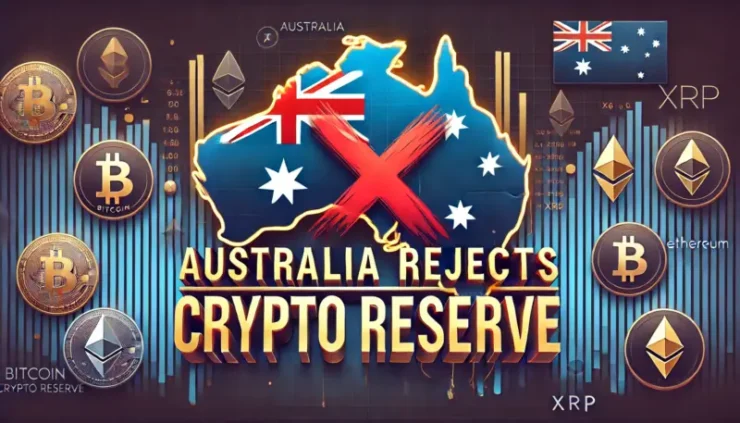The Australian government has confirmed it will not establish a crypto reserve, diverging sharply from the United States, where President Donald Trump has announced plans for a strategic digital asset stockpile. Despite growing global momentum for national cryptocurrency reserves, Australia’s ruling party remains focused on regulation rather than investment.
Trump’s announcement on March 2 directed the President’s Working Group on Digital Assets to include Bitcoin (BTC), Ethereum (ETH), Ripple (XRP), Solana (SOL), and Cardano (ADA) in the U.S. crypto reserve. The move follows a broader trend in U.S. states considering the addition of cryptocurrencies to their balance sheets. The decision was framed as a corrective measure to what Trump described as “corrupt attacks” on the industry by the Biden administration.
Australia’s Assistant Treasurer and Financial Services Minister Stephen Jones’ office has ruled out a similar initiative, stating that the government’s focus remains on regulating digital asset platforms. A spokesperson for the minister told Cointelegraph that the Albanese government is prioritizing a “fit-for-purpose digital asset regulatory regime.” The government sees blockchain and digital assets as valuable for economic and financial sector growth but does not plan to allocate public funds to cryptocurrency investments.
Crypto Reserve Faces Political and Market Challenges
While Trump’s announcement initially led to significant cryptocurrency price surges—Solana gained nearly 20%, ADA rose by over 63%, and XRP jumped 28%—a sharp reversal followed. Bitcoin fell over 8%, XRP lost 18%, and ADA plummeted by 23%. The volatility has underscored concerns over the feasibility of a government-backed crypto reserve.
In Australia, skepticism about such a move extends beyond government officials. Tom Matthews, head of corporate affairs at Australian crypto exchange Swyftx, noted that while the concept of a strategic reserve has appeal, it carries risks.
“If one of the main goals of your country’s strategic reserve is to hedge against crises, the price volatility of crypto is a problem,” he said. “It is just difficult to see where the political traction is going to come from.”
Kraken Australia’s managing director, Jonathon Miller, suggested that while crypto has established itself as an investment-grade asset, it is more likely to be included in sovereign wealth funds rather than a dedicated government reserve. “If it’s suitable for [ETFs and superannuation funds], it’s certainly worth consideration for long-term asset allocators like the Future Fund and even Treasury,” Miller said.
Australia’s financial regulators have already taken steps to tighten oversight of digital assets. The Australian Transaction Reports and Analysis Center (AUSTRAC) plans to shift its focus toward cryptocurrency firms in 2025, targeting crypto ATM providers that may be violating anti-money laundering laws. In December, the Australian Securities and Investment Commission (ASIC) issued a consultation paper proposing that many digital assets be classified as financial products, requiring firms to obtain licenses to operate legally.
Australia’s cautious stance stands in contrast to Trump’s aggressive push to integrate cryptocurrencies into national financial strategies. Trump has framed the move as an effort to position the U.S. as the “Crypto Capital of the World.” The president has also rolled back regulatory actions taken under Biden, including withdrawing SEC investigations into multiple crypto firms and dropping a lawsuit against Coinbase.
Election Uncertainty and Future Crypto Policies
Australia’s reluctance to embrace a national crypto reserve comes at a time of potential political change. A federal election must be held on or before May 17, and polling data from YouGov shows the center-right coalition narrowly leading the Labor government, 51% to 49%. While a coalition spokesperson did not respond to requests for comment, a change in government could alter the nation’s approach to digital assets.
Meanwhile, Trump’s crypto policies have sparked both enthusiasm and criticism in the U.S. industry. Coinbase CEO Brian Armstrong suggested that Bitcoin alone should be included in the reserve, arguing that it provides the clearest analogy to gold. Others, such as Palantir founder Joe Lonsdale, have condemned the move as a misuse of taxpayer funds. Jason Calacanis, co-host of the “All-In” podcast, called it an “insane grift,” claiming that most Trump supporters privately oppose the idea but are reluctant to speak out.
While Australia remains committed to regulatory oversight, Trump is doubling down on his crypto push. On March 7, the White House is set to host its first-ever Crypto Summit, an event expected to solidify the administration’s digital asset policies.





